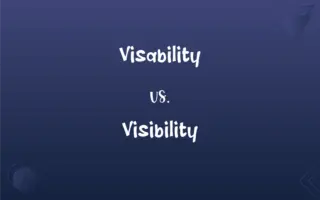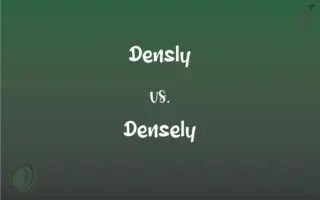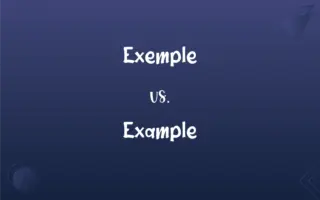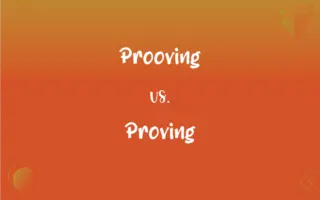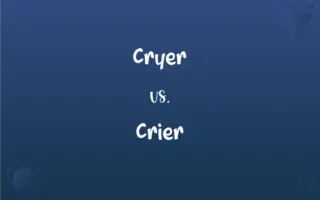Placeing vs. Placing: Mastering the Correct Spelling
Edited by Aimie Carlson || By Janet White || Updated on March 8, 2024
"Placeing" is incorrect; the correct spelling is "placing." Placing refers to the act of putting something in a specific position or location.
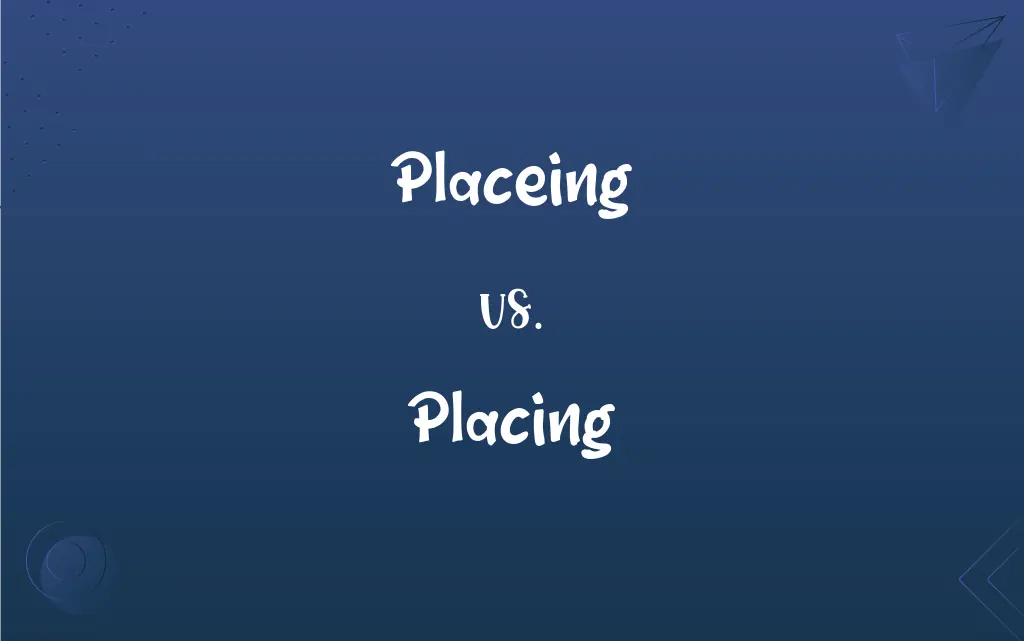
Which is correct: Placeing or Placing
How to spell Placing?

Placeing is Incorrect

Placing is Correct
ADVERTISEMENT
Key Differences
"Placing" follows the common rule of dropping the 'e' before adding '-ing.'
Think of the word "replacement," which also has the root 'place.'
The word 'placing' keeps the 'c' just like in 'placing a call.'
Associate 'placing' with 'spacing'—both share the '-acing' ending.
Remember that 'place' becomes 'placing,' similar to 'race' becoming 'racing.'
ADVERTISEMENT
Correct usage of Placing
He was placeing the dishes in the dishwasher when he dropped one.
He was placing the dishes in the dishwasher when he dropped one.
The kids were excited about placeing their new plant in the garden.
The kids were excited about placing their new plant in the garden.
She had trouble placeing the picture straight on the wall.
She had trouble placing the picture straight on the wall.
They were placeing bets on who would win the race.
They were placing bets on who would win the race.
Placing the book on the shelf made her feel organized.
Placing Definitions
Assigning a rank or position in a competition.
Her excellent performance led to placing first in the race.
The act of putting something in a particular position.
He won the contest by skillfully placing the pieces.
Integrating a new element into an existing arrangement.
Placing the new sofa in the living room changed its ambiance.
Positioning with care or precision.
She focused on placing each flower perfectly in the bouquet.
Establishing someone or something in a specific context.
Placing the artifact in the museum attracted many visitors.
An area with definite or indefinite boundaries; a portion of space.
Room or space, especially adequate space
There is place for everyone at the back of the room.
The particular portion of space occupied by or allocated to a person or thing.
Placing Sentences
She is placing her shoes in the rack.
He enjoys placing stickers on his notebook.
Placing a vase on the mantlepiece brightens the room.
They are placing the chairs around the table for dinner.
They're placing flags along the driveway for the Fourth of July.
The librarian is placing the returned books back on the shelves.
She's placing a blanket over the sleeping child.
He's placing the puzzle pieces together carefully.
Placing the lamp in the corner added warmth to the room.
She's placing her order at the coffee shop.
He's placing a call to his friend in another city.
The teacher is placing the books on the students' desks.
Placing a bookmark saves your spot in the book.
She's placing her vote in the ballot box.
They're placing importance on getting enough sleep.
Placing a coat of paint on the fence will protect it.
The baker is placing cookies on the baking sheet.
They are placing emphasis on quality over quantity.
The chef is placing garnishes on the dishes.
The artist is placing the final touches on the painting.
They are placing a welcome mat at the front door.
He's placing a cap on his head before leaving.
Placing a crown on the king's head is a symbol of authority.
The gardener is placing mulch around the plants.
FAQs
What is the verb form of placing?
"Placing" itself is the verb form, specifically the present participle of "place."
What is the pronunciation of placing?
Placing is pronounced as /ˈpleɪsɪŋ/.
What is the root word of placing?
The root word of "placing" is "place."
Which preposition is used with placing?
Prepositions like "in," "on," or "at" are commonly used with "placing."
Why is it called placing?
It's called "placing" because it refers to the act of putting or setting something in a particular position.
What is the singular form of placing?
The singular form is "placing."
Which conjunction is used with placing?
Conjunctions like "and" or "but" can be used with "placing."
Is placing an adverb?
No, placing is not an adverb.
Which vowel is used before placing?
The vowel used before "placing" depends on the context; it can be 'a' or 'an.'
Is placing an abstract noun?
As a gerund, it can be considered an abstract noun.
Is placing a vowel or consonant?
"Placing" is a word, not a vowel or consonant.
Is placing a countable noun?
When used as a noun, it's generally uncountable.
Is the placing term a metaphor?
It can be used metaphorically in some contexts.
What is the plural form of placing?
"Placing" does not have a traditional plural form as it's a verb.
Is placing a noun or adjective?
Placing can be a noun (gerund) or a verb, but not an adjective.
Is placing a negative or positive word?
Placing is neutral; it's neither inherently negative nor positive.
Is placing a collective noun?
No, placing is not a collective noun.
What is the opposite of placing?
The opposite of placing could be "removing" or "displacing."
What is the third form of placing?
The third form is also "placed."
Which article is used with placing?
The article "a" or "the" can be used with "placing," depending on the context.
Is the word placing imperative?
"Placing" can be used in the imperative mood, e.g., "Placing the items here."
Which determiner is used with placing?
Determiners like "the," "a," or "this" can be used with "placing."
How many syllables are in placing?
There are two syllables in "placing."
How do we divide placing into syllables?
It is divided as pla-cing.
What is another term for placing?
Another term for placing is "positioning."
What is the first form of placing?
The first form is "place."
How is placing used in a sentence?
Example: "The artist is known for placing vibrant colors strategically in his paintings."
What part of speech is placing?
Placing is a verb or a noun (gerund).
What is the second form of placing?
The second form is "placed."
What is a stressed syllable in placing?
The first syllable, "pla," is the stressed syllable in "placing."
About Author
Written by
Janet WhiteJanet White has been an esteemed writer and blogger for Difference Wiki. Holding a Master's degree in Science and Medical Journalism from the prestigious Boston University, she has consistently demonstrated her expertise and passion for her field. When she's not immersed in her work, Janet relishes her time exercising, delving into a good book, and cherishing moments with friends and family.
Edited by
Aimie CarlsonAimie Carlson, holding a master's degree in English literature, is a fervent English language enthusiast. She lends her writing talents to Difference Wiki, a prominent website that specializes in comparisons, offering readers insightful analyses that both captivate and inform.
